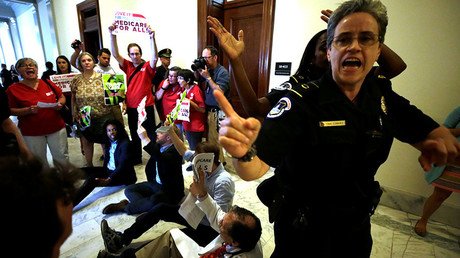States can force ‘able-bodied’ to work for Medicaid, rules Trump administration

The Trump administration’s new Medicaid guidelines will allow states to impose work requirements on ‘able-bodied’ recipients to keep their cover. Critics say the plan violates federal law.
The new guidance allows states to apply for waivers, something that has never happened in Medicaid’s 50-year history. Pregnant women, children, the elderly and the disabled are exempted from the requirements.
The Centers for Medicare and Medicaid (CMS) administrator, Seema Verma, said on Twitter the new effort will “improve Medicaid enrollees health outcomes by incentivizing community engagement.”
Seema Verma: "This is about helping people to rise out of poverty." https://t.co/F9jT5o3MkN
— Alison Kodjak (@alikodjakNPR) January 11, 2018
“This is about helping people rise out of poverty,” Verma said in a conference with reporters, according to NPR. She cited studies that show a correlation between good health and having a job.
Medicaid is a government program for people of all ages whose income and resources are insufficient to pay for health care. It also offers benefits like nursing homes and personal care services. Medicare provides free health insurance to 74 million American citizens. It is a means tested program managed at state level and jointly funded by state and federal government.
Ten states, including Arizona, Arkansas, Indiana, Kansas, Kentucky, Maine, New Hampshire, North Carolina, Utah and Wisconsin, have already filed applications with CMS to add work requirements to their Medicaid programs.
It is not clear how many people will be affected by the new rules. A study by the Kaiser Family Foundation found some 60 percent of working age, non-disabled Americans who are Medicaid enrollees are in work. That represents about 15 million people. Nearly eight in 10 recipients live in families with at least one member in employment, according to the study. It is more common for Medicaid enrollees to hold jobs if they live in states that expanded Medicaid under Obamacare. Some 31 states, plus the District of Columbia, broadened their Medicaid programs to include adults earning up to roughly $16,600 a year.
#GreatReads from @dylanlscott: "There is no pandemic of #Medicaid enrollees who are avoiding work to stay on the program's rolls..." https://t.co/OWnxoo5B9rpic.twitter.com/tMzi85RPJc
— Center on Budget (@CenterOnBudget) January 11, 2018
Many recipients do not work because of illness (36 percent) or family obligations (30 percent), the study found.
Democrats are opposed to the changes and are expected to sue, arguing the administration does not have the power to make them without action from Congress, a view shared by Joel Berg, CEO of the New York-based nonprofit Hunger Free America.
“For a practical matter, even if this is allowed to go into effect by a court, I think there is a reasonable chance a court will overturn it because it violates federal law,” Berg told RT. “It would only apply to the ten or so states run by far-right Republicans who have asked to do this. Many of the bigger states this would not apply to at this point. But it is an appalling precedent, and just ghastly that it would be applied to just one American.”
Berg said healthcare is a human right and to say you can’t have it if you’ve only worked so many hours “is cruel, counterproductive and idiotic.”
Federal law states what an American has to do to qualify for Medicaid, he said. No state or federal administrator can add another requirement that is not in federal law.
“As an example in the TANF program, the cash assistance program, there is authorization to include work limits and work requirements, and there is no such requirement in the Medicaid law,” said Berg. “For the Republicans fulminating rabidly under Obama that a president cannot make up law and he is able to bypass Congress by executive memorandum, this is exactly that - on steroids.”
.@thehill Not a penny is provided for job training, placement, or creation. The new work reporting required will increase paperwork and bureaucracy, but not increase employment. It will take away health care from those who need it most. Cruel and stupid.
— Joel Berg (@Joelsberg) January 11, 2018
All the policy will do, Berg said, is increase bureaucracy and paperwork, “supposedly from the small government people,” because it will force working people to leave work, or those on a job search to stop searching and have to go to a government office to fill out a form to show they are working or searching for a job.
“This policy move does not include a single penny to job training, does not add a penny to job placement, does not add a penny to job creation,” Berg remarked. “And so the net effect of this policy isn’t going to be to get more people to get jobs, it is for more people not to have health care, they are going to get sicker and have less ability to get jobs.”














